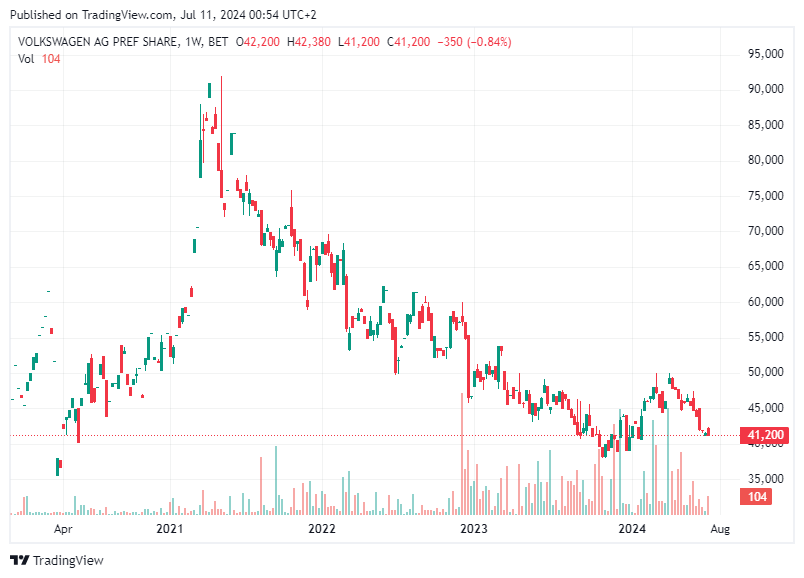Volkswagen Lowers Margin Outlook Over Audi Plan Closure Concerns
Volkswagen Lowers Margin Outlook Amid Potential Audi Plant Closure.

Disclaimer: The information provided in this article is based on recent developments and publicly available information as of the date of publication. The article aims to provide a detailed analysis of the situation but should not be construed as financial advice or a recommendation for investment.
Real-time information is available daily at https://stockregion.net
Volkswagen, one of the world's leading automakers, has recently announced a downward revision of its 2024 operating return on sales forecast. This adjustment comes amidst potential closures of its Brussels Audi plant and other unforeseen expenses that have impacted the company's financial outlook.
On Wednesday, Volkswagen shares experienced a noticeable decline following an overnight profit warning. This alert was partly triggered by the looming possibility of closing the Brussels Audi plant and a 3.8% drop in second-quarter sales, heavily influenced by a downturn in China. Specifically, deliveries in China—a crucial market for Volkswagen—fell by nearly 20%. This decline is part of a larger trend affecting the sales of combustion engine vehicles, which still constitute the majority of Volkswagen's lineup in the region. As China accelerates its transition towards an all-electric vehicle market, Volkswagen has announced plans to expand its battery-powered offerings in the coming years. The company aims to prioritize profitability even as local competitors in China aggressively reduce prices by up to 50%.
"We do not expect an easy year," a spokesperson from Volkswagen stated, highlighting the challenging road ahead.
Volkswagen has revised its 2024 operating return on sales forecast to a range of 6.5-7%, down from the previous estimate of 7-7.5%. One of the pivotal factors contributing to this downward revision is the consideration of closing the Audi plant in Brussels, which employs approximately 3,000 workers. The primary reason for this potential closure is the waning demand for Audi's higher-end electric vehicles produced at the site. As of 10:30 GMT, Volkswagen shares had fallen by 1.13% to 105.4 euros, contributing to a cumulative 5.5% decline so far this year. According to Volkswagen, finding an alternative use for the Brussels plant or opting for its closure could incur costs up to 2.6 billion euros ($2.8 billion) within the current financial year. A consultation process is underway to explore viable alternatives for the site.
Shift in Production
The uncertainty surrounding the future of the Brussels plant emerged earlier this year when Audi disclosed that the next model following the Q8 e-tron would be manufactured in Mexico. This decision has prompted speculation about the fate of the Brussels facility. Audi reported that rising orders for newer models such as the Q6 e-tron, set to enter the market this year, have led to a sharp decline in interest for the older Q8 e-tron, which is currently produced in Brussels. Despite these challenges, Audi remains committed to catching up with its premium carmaker competitors BMW and Mercedes in the transition to electric vehicles.
Stephen Reitman of Bernstein Research pointed out that "Products like the first generation Q8 e-tron were halfway solutions—not the full clean sheet like Audi has done with its new premium electric platform." He added that the potential for the Q6 e-tron is higher. Audi has promised a major refresh in 2024 and 2025, with plans to introduce over 20 new electric and combustion engine models. From 2026 onwards, the company intends to focus solely on EV-only models.
Addressing Excess Capacity and Costs
Volkswagen, known for its strong union representation, has not closed a plant in four decades. Analysts suggest that the carmaker is now under considerable pressure to reduce its substantial excess production capacity. Daniel Schwarz of Stifel Research noted, "Given the low margin on first-quarter results, now is the time to negotiate with unions." Some industry analysts view the potential closure of the Brussels plant as a positive step towards addressing the company's costs and excess capacity. Philippe Houchois of Jefferies remarked, "People worry because the headline figures play into the concern that VW is in trouble. But this is a business with too much cost, and they're addressing that."
As the market rapidly shifts towards electric vehicles, traditional automakers are compelled to adapt their strategies and operations. Volkswagen's decision to lower its margin outlook and consider plant closures highlights the financial pressures and adjustments necessary to navigate this evolving landscape. The potential closure of the Brussels Audi plant not only impacts the company's workforce but also reflects the broader industry trend of shifting manufacturing bases to regions with more favorable economic conditions. The move to produce the follow-on model to the Q8 e-tron in Mexico is indicative of this strategy.
The aggressive pricing competition in China from local carmakers presents another layer of complexity for Volkswagen. As a key market for the company, China's transition to electric vehicles demands a rapid and effective response from international automakers to maintain their competitive edge.
Volkswagen's recent announcement to lower its 2024 operating return on sales forecast and contemplate the closure of its Brussels Audi plant marks a moment for the company and the wider automotive industry. Faced with declining sales in China, increasing competition from local electric vehicle manufacturers, and the need to address excess production capacity, Volkswagen is at a critical juncture.
The company's commitment to expanding its electric vehicle offerings and prioritizing profitability amidst these challenges will be closely watched by industry analysts and stakeholders. As Volkswagen navigates this complex landscape, the outcomes of its decisions will have far-reaching implications for its future performance and position within the global automotive market.
Disclaimer: This article aims to provide a comprehensive analysis of the recent developments involving Volkswagen. The information presented is based on publicly available sources and should not be interpreted as financial advice or a recommendation for investment. Readers are encouraged to conduct their own research and consult with financial professionals before making any investment decisions.
Real-time information is available daily at https://stockregion.net


